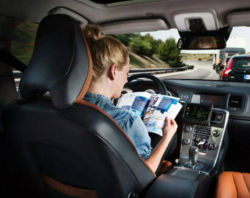
— Self-driving technology regulations won't be pushed on individual states even once the federal government sets its standards.
The National Highway Traffic Safety Administration (NHTSA) has been quick to get self-driving cars on the roads, going so far as to say new technology could possibly be approved before it's even installed in a single car. That position may change since the death of a Tesla driver using automated driver-assist technology, but NHTSA still plans on creating regulations that won't interfere with what states want.
Google, Tesla and others pushing self-driving technology aren't happy due to the confusion that will be caused if one state has specific regulations but the state next door has other rules.
Driverless car companies say they will have problems building self-driving cars that may be legal in one state but illegal in any other number of states.
Self-driving lobbying groups are complaining about trying to cope with what they call a "patchwork" of state regulations that aren't consistent. At least eight states have created some sort of self-driving laws but much of the legal issues concern testing driverless cars, not the full adoption of the technology.
California is the state taking the lead on self-driving rules because most companies are using California for road tests of the cars. California has already proposed rules that will require every self-driving car to be equipped with pedals, a steering wheel and a licensed driver behind the wheel.
California regulators say driverless car manufacturers need to train consumers about how to use the cars, including how autonomous technology works, is turned on and off, how it's used and how it's monitored.
Other states have talked of different actions, some that will allow a driver to have a normal driver's license or a state like New Jersey that has talked about creating a special self-driving car license.
Laws proposed in Michigan would allow self-driving cars to travel on highways at a very close distance, what Michigan calls "platooning." Lawmakers have also proposed driverless cars be just that, driverless, with no human behind the wheel (if a wheel exists) to monitor the technology.
NHTSA says self-driving cars must be at least twice as safe as typical cars to have any kind of impact on fatalities and more than twice as safe to have any long-term benefit. Safety regulators expect thousands of self-driving cars to be running the roads by 2020 and possibly hundreds of thousands by 2025.
President Barack Obama wants to spend $4 billion over the next 10 years to create self-driving technology and implement it as quickly as possible.




